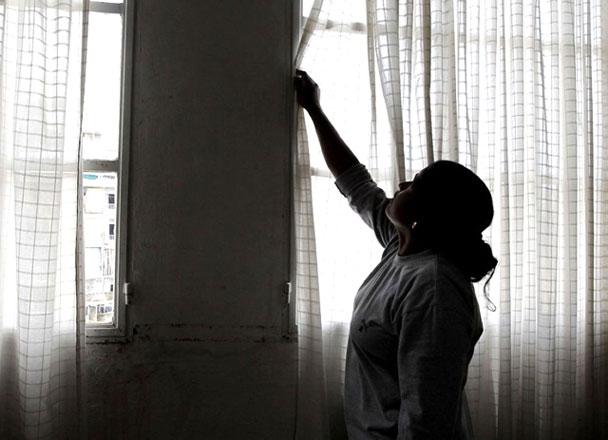You are here
‘Official efforts unlikely to resolve problem of illegal workers’
By Laila Azzeh - Feb 23,2015 - Last updated at Feb 23,2015
AMMAN — With the government launching another campaign this week to track down illegal guest workers, activists voiced their doubts on Monday of the effectiveness of such measures in rectifying the situation of over 1 million illegal labourers in Jordan.
These efforts lack “the seriousness to permanently resolve the issue and seek to collect money rather than regulate the labour market”, charged Linda Kalash, executive director of Tamkeen for Legal Aid and Human Rights.
At a round table discussion organised by Tamkeen and the Open Society Foundation’s Arab Regional Office, representatives of human rights groups and recruiters acknowledged that illegal workers remain a vital — and perhaps a “favourable” — workforce in the local market.
They said the government has “failed in dealing with the guest workers’ file”, arguing that the Labour Ministry’s 160 inspectors are incapable of checking the situation of around 1.2 million guest workers across the Kingdom.
The situation is exacerbated by the Syrian refugee influx into the Kingdom, with the number of illegal Syrian workers estimated at 160,000, of whom 30,000 are children.
“Only 5,700 Syrians have work permits, [constituting] about 1.10 per cent of all Syrians in the labour market,” Kalash said.
She underlined that guest workers “fall prey” to sponsorship regulations, which allow employers to “blackmail” them and prevent them from going back to their countries.
“Egyptian contracts, for example, do not stipulate any rights for the workers,” Kalash claimed.
During the discussion, activists said employers tend to prefer recruiting illegal workers in order to blackmail them and exploit their situation by forcing them into working longer hours while controlling their wages.
Lawyer Hussein Omari, who specialises in the rights of illegal workers, noted that 95 per cent of illegal labourers do not carry their passports, as their employers keep them to ensure they do not travel.
“This eventually hampers the workers’ attempts to file lawsuits against their recruiters because prosecutors general ask them to prove their identity so that they can take the case,” he said.
Omari argued that “workers always seek to be legal, but become unlawful due to reasons caused by the employers.”
“Even when they are caught, penalties imposed on employers found in violation of the law are somewhat trivial and fail to act as a deterrent,” noted Hadeel Abdul Aziz from the Justice Centre for Legal Aid.
The long period of litigation, which can take anywhere between three to five years “due to legislative loopholes and bureaucracy”, forces illegal workers to accept “unjust” settlements, the participants argued.
They claim guest workers prefer to cooperate with Labour Ministry inspectors more than any other legal channel because they know that they will not be arrested.
“Therefore, the inspection campaign should be developed, especially by increasing the number of inspectors,” Omari said.
Local workforce
While looking into ways to improve the rights of guest labourers in Jordan, the legal experts expressed concern over the rights of citizens who constitute “only 12 per cent of the total number of workers”.
“Some 98,000 Jordanians stopped paying their subscriptions to the Social Security Corporation [SSC] in 2014 after leaving their jobs,” SSC Media Director Musa Sbeihi said.
He added that this is the result of illegal workers taking over Jordanians’ job opportunities.
“The plan was to ensure the gradual replacement of guest workers by Jordanians, but the reality on ground is that guest workers are replacing citizens,” Sbeihi underlined.
Moreover, he noted that about 36 per cent of Jordanian workers earn less than the minimum wage.
“A total of 72,000 people subscribed to the corporation earn less than JD200 a month,” the SSC spokesperson added.
Kalash said the recently endorsed by-law governing recruitment agencies for domestic helpers includes some “good” provisions that guarantee the rights of all parties involved.
The by-law introduces a compulsory insurance policy that compensates employers if workers run away or refuse to work, in addition to covering the helpers with medical insurance and providing compensation in case of death or work injury.
Around 50,000 domestic helpers of various nationalities currently work in Jordan, the majority from Bangladesh, according to the Domestic Helpers Recruitment Agencies Association.
Labour Ministry inspection teams apprehended around 29,221 illegal guest workers of different nationalities in 2014.
In addition, 2,095 violating establishments were closed in 2014, while 808 establishments were closed the previous year.
In 2013, the ministry apprehended 22,941 illegal guest workers.
Related Articles
AMMAN — Isolated from the world, not allowed to communicate with anyone or to leave the house, Monika, a domestic worker, said she suffered
AMMAN — Labour activists on Wednesday welcomed a recent Cabinet endorsement of amended regulations that guarantee additional rights for fore
AMMAN — The Ministry of Labour on Wednesday issued a report on the current status of the domestic sector, which showed that some 58,262 dome
















